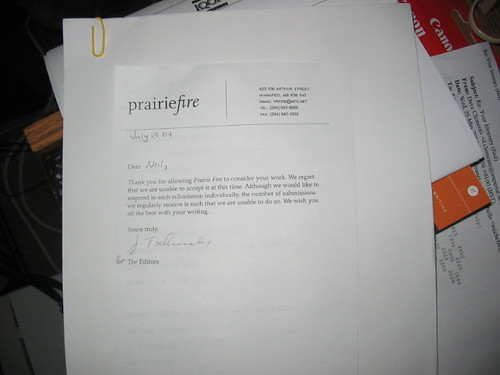Do you know how to interpret the rejection letters you get? Figure out what agents really mean when they say your book "isn't the right fit" or "doesn't meet our current needs," and figure out what you need to do to start getting some different answers.
Interpreting the Literary Agents
Literary agents speak in a polite code couched in metaphors...and it practically takes a degree to figure out. I myself have received many, many hundreds of rejection letters, so I can speak with some authority when I say that rejections are all very similar. You'll see the same vague phrases over and over, and it's easy for authors to make themselves crazy staring again and again at those words.
Stop staring. It's time to decipher those polite phrases, and figure out what agents actually mean when they say what they say.
- Form Rejections
Just about every author has received form rejection letters. These are generic slips of paper or emails that may be so impersonal they actually start with "Dear Author" instead of your name. It's just a few short paragraphs, or maybe just one, that says they aren't "seeking new submissions at this time" or the manuscript "doesn't sound like it would be a good fit" or perhaps it's because they just "aren't the right agent for this particular work." Some of them are smart enough to shift the blame to themselves, but truthfully that isn't helpful to you.
Because no matter how the agent tries to frame it, the impersonal form rejection tells you that one of the following is true: the agent didn't think the work is marketable, the agent already has projects that are very similar to yours, or the agent just didn't love it. They have to love it before they're willing to think about taking it on.
How to respond: The agent didn't give you much to go on, and there's a reason. First things first: re-read your entire manuscript with an editor's eye. Double-check all your mechanics, formatting, grammar and punctuation. If you didn't get the courtesy of a personal response, it could be due to errors within your submission. You should also re-write your query letter, make it more interesting, and try harder to "hook" agents with your letter. A boring query letter is very likely to get meaningless "no" response.
- The Personal Comment
If you are quite lucky, you'll get a comment tacked on at the end of a form letter, maybe even a signature signed in actual ink. If this happens, be amazed and pleased with yourself. This means the agent who's signing the letter actually did read what you sent, and they felt very strongly about you or your writing. It's hard to feel good about a comment that still tells you no, but you should. It means you're very close.
Of course, a tacked-on comment at the end of a form letter isn't going to tell you very much. In all likelihood it's still going to say something sort of generic, like "just not right for me" or "didn't love it as much as I hoped I would." But something about your writing did grab them, that is definitely true. Otherwise, they would not have bothered to scribble the note.
How to respond: Write back, and say thank you. It sounds weird to write thank-you notes upon receiving a rejection, but that's what you ought to do. Be polite, and maybe that agent will be more receptive to you when you send another query letter. Maybe they'll even respond in more detail. Probably nothing will happen, but that's the business. Once you jot off that email, go back to your manuscript. Check over the first few chapters; this is the part that sells the book. If your first two chapters too excessively detailed or too exposition-heavy, that warrants a rejection. Get to some action, quick, in order to grab onto the reader (and the agents). Perfect these chapters, tweak your query letter, and try again.
- The Detailed Letter
Very rarely, if your work is quite good and just a fraction short of being ready for publication, you will receive a detailed rejection letter. The agent may point out specifics that you need to change. The best case scenario is a "revise and resubmit" letter, in which the agent asks you to make specific changes and invites you to re-send the manuscript for their viewing. Work very hard to follow their instructions and take your time before you resubmit. You just got a do-over. That's like winning the lottery.
How to respond: In most cases, however, the detailed letter will still be a rejection -- with vague instructions that don't mean much. Review those comments carefully, and read them more than once. After that first reading, after your guts have been ripped out, put the letter away. Wait a week. Read it again, and then take a look at your work. Try to absorb the criticism you've received, and respond in kind. Tweak your query letter, and try again.
You're going to get rejected. Many of the greats have also been rejected. You should keep writing, and keep trying. But you should also fix your work, and keep revising it. The further you move up the rejection ladder, the better you're getting as a writer.











I think personal comments are even rarer these days than they used to be - so they're even more prized!
ReplyDelete